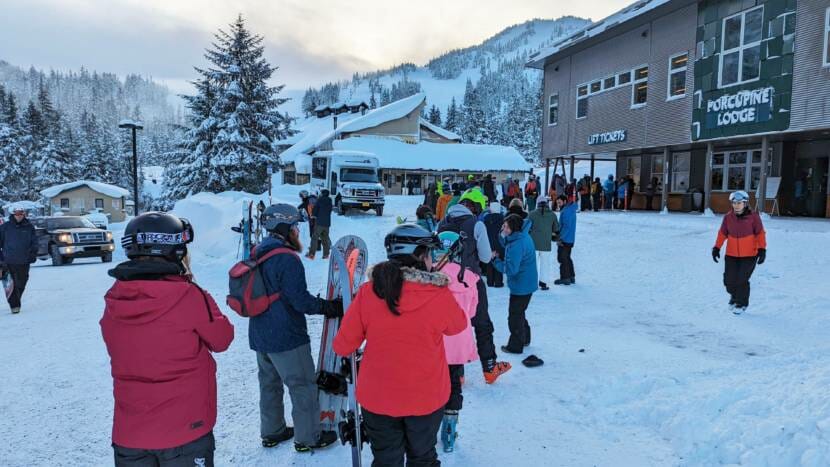
On a Saturday in December, the line for lift tickets and rentals at Juneau’s city-owned ski area was about an hour and a half long. Eaglecrest Ski Area managers say there were several factors that likely contributed to the unusual line, including that they are short-staffed.
Labor shortages, especially for low-paying jobs, have been common this past year across many industries. On the mountain in Juneau, starting pay for lift operators, food service workers and others is below the state minimum wage.
On Tuesday, Eaglecrest Ski Area was closed. But there was a fresh dump of snow overnight and a few dozen cars were in the parking lot. A trickle of people came and went, with gear for skinning up the slopes while the lifts weren’t running.
“We just hiked to the top and wanted to get some fresh powder in,” said Jake Hamilton, who also worked as a lift operator at the ski area last season.
“I honestly didn’t know how much I was being paid when I started. … I didn’t ask,” he said with a laugh. “I just wanted to ski.”
Free skiing and free transportation to work are some of the job perks. But the lifts usually only run five days a week, his work week.
“I ended up quitting ‘cause I wasn’t skiing enough. I wanted to ski more.” Hamilton said. “The pay itself wasn’t enough to sustain a living.”
“Staffing has been an extreme challenge this year, much more so than previous years,” said Dave Scanlan, Eaglecrest’s general manager.
Scanlan and other city officials have been talking about the ski area’s unusual pay scale for months.
It begins at $8.50 an hour. That’s a $1.84 below Alaska’s minimum wage. The state minimum wage law doesn’t apply to government workers and Eaglecrest is city-owned. Eaglecrest does have to meet federal minimum wage, which is $7.25.
“So we do our best to fill people in higher positions as much as we can to be slightly competitive, but our entire wage scale is just so far below every other city department,” Scanlan said.
Like libraries, pools and other city services, the ski area’s budget doesn’t balance itself without taxpayer support. About $3 out of every $10 it takes to run the ski area comes from local taxes.
For the next ski season, Scanlan and his board of directors plan to ask the Juneau Assembly for enough money to bring entry-level pay up to the state minimum wage, and apply that same 22% increase up the entire pay scale. He said that would also bring Eaglecrest workers’ pay in line with industry norms around the country.
“So as you can imagine, there’s definitely a real financial impact to fixing this problem, and that’s kind of how we got into the position that we’ve been in,” Scanlan said.
For this season, board member Shawn Eisele said it’s possible there may be end-of-season bonuses if the ski area’s finances stay on the trajectory they’ve been on so far.
Eisele also spends a lot of time skinning and skiing on the mountain. He’s a little wistful about seasonal ski jobs.
“I mean, I think everybody who grows up skiing, like, thinks about being a ski bum at some point, right?”
He said that worked for a lot of people in the past, but times are changing.
“Particularly, like, you look at ski patrol, all the safety certifications they have to have and just – no matter which job it is, there’s a lot more responsibility that’s expected of people now,” Eisele said. “And so, it’s time to bring that up. And just with COVID, like, wages have risen everywhere in the last couple years, so you need to stay competitive.”
Eaglecrest’s leadership has also been working on big picture, long-term plans to expand operations on the mountain in a way that reduces or eliminates the burden on taxpayers. Ideas there include a lot of off-season activities, like lift-assisted mountain biking, ziplines and accessible activities for cruise ship visitors.
For the winter, Scanlan said there may be a way to operate seven days a week — which would also make living the ski bum dream a little more accessible.